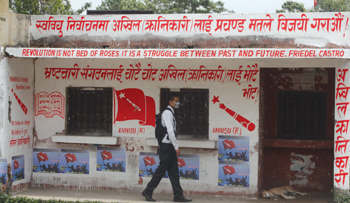The uncertainty over politicised student union elections reflects doubts over national elections

DEVYANI SHIWAKOTI
Campuses are covered in a sea of red as college students across Nepal prepare for union elections that were scheduled for next week. Ever since the Panchayat, college elections in Nepal have been a proxy for the political parties which were banned in those days. And today, just like national elections are uncertain, student elections start looking iffy just as their dates are announced. There was already a controversy about voter lists, with allegations that student unions have padded it with fake student admissions. This week after university officials and student-body representatives failed to agree on technicalities, the elections were indefinitely postponed. 6 June will be yet another deadline missed by the country.
Free Student Union (FSU) elections for 60 constituent campuses of TU are supposed to take place annually, but were put on hold for four years because of disagreements over the electoral system, finally settling on a mixed electoral system earlier this year. Even after TU announced dates for April, polls were pushed back twice due to lack of preparation. Seen as a dress rehearsal for the CA elections later in the year, parent parties went all out to boost the chances of their proxies. Party leaders who don’t tire of harping on the virtues of free and fair elections funded unions and instructed them to do whatever it took to bolster vote banks. Union heads held college administrators hostage earlier this month and hundreds of fake students were admitted.
The lead up to college elections has not only set a wrong precedent for national polls, it also shows how the rot in Nepali politics starts at the very bottom. With unions heavily reliant on parent parties for funds and institutional support, it’s not surprising to see problems that are all too familiar on the national level: corruption, violence, and
intimidation. Students are conscripted as foot soldiers to do their parties’ dirty work in college campuses. From enforcing bandas by burning school buses to manhandling college management, student unions are anything but student friendly.
“There are broken chairs, light bulbs don’t work, the library does not open on time, we don’t have a set timetable for exams, and results are published ten months later. Why don’t unions pay attention to these basic issues first?” asks 24-year-old Ranjana Koirala, an English literature student at Patan Multiple Campus. “Let politicians do the politics.”
Ask union heads why campus life is so politicised and why issues of federalism get precedence over more pressing concerns like reforming the university system or youth employment, the answer is the same regardless of which flag they fly: “If politics is set right, then everything else will fall in place.”
Students shouldn’t be held hostage to promises of a stable polity. Even through a decade of conflict Nepal managed to achieve 90 per cent enrolment in primary schools and virtual gender parity. These children will soon be going to college. They need a more modern curriculum, better infrastructure, regular and reliable classes free of politics.
When TU tried to introduce an age limit of 28 for candidates contesting FSU elections, students filed a petition. The Supreme Court had to intervene and declare the act would come into effect starting from 2015. Leaders who use colleges as a stepping stone into mainstream politics will see their careers end if the age bar is implemented and will no doubt revolt again in 2015.
Student unions and political parties make all decision within campus grounds, and this points to institutional failure in Tribhuvan University. For a month in April, the university was without an examination controller as parties tried to arm twist their candidate to the post.
Having a student body that is politically aware and informed is good for the nation, but when students set such low standards of activism, the future of Nepali politics looks dismal. The only way student leaders can gain genuine affection and support from their peers is if they lose some of their revolutionary zeal, and focus on what is important: improving the basics of student life and letting their responsible and accountable behaviour trickle up into national politics.
Read also:
Political overkill